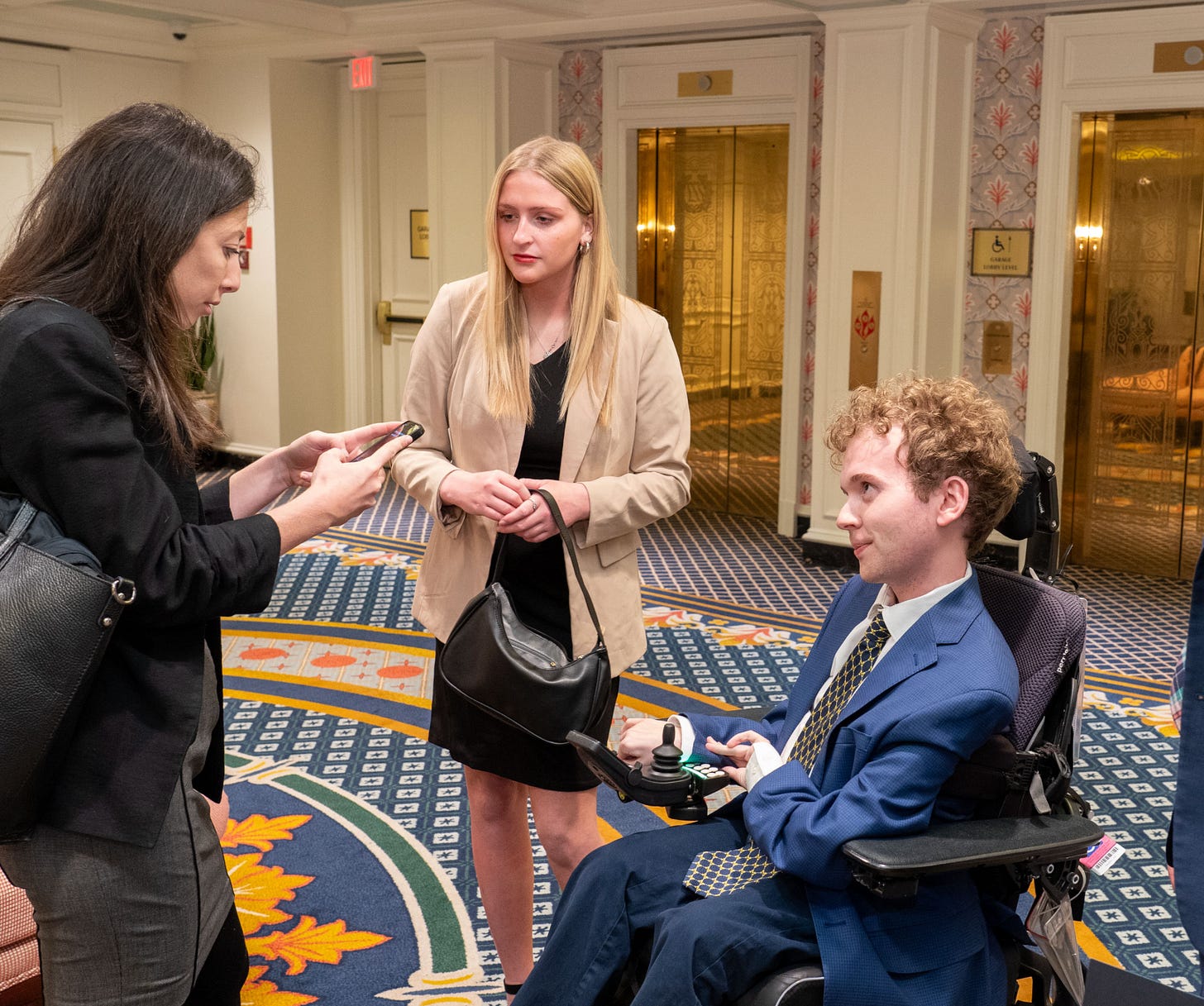Who is included in Trump's America?
In multiple ways, Trump is pushing people with disabilities out of public life
The shock campaign we’ve endured over the last month has been overwhelming, and confusing, which is precisely the point. Amidst the chaos, it is easy to miss how the changes are impacting people on the ground. So I want to tell you about Vincent.
Vincent is working on his Masters in Public Policy and J.D. at the University of Michigan, both top 10 graduate programs. As you might imagine, he’s managing a demanding workload, and like any student working at the intersection of law, public policy and government, he has new reason to worry about what his career prospects look like.
Vincent is smart, talented, and hard working. He’s a joy to have in my class. For my fellow teachers, he does the reading.
He also has Spinal Muscular Atrophy Type II. He uses a wheelchair to get around, and relies on assistance from paid care providers. When he arrived at UM, his father spent the first semester living in his dorm room because there wasn’t another option. So, Vincent built another option. He helped design and develop the system that he, and other college students across Michigan, use to access care providers on the UM- Ann Arbor campus
This is precisely the kind of student that we want. He saw a problem. He then tackled it—but in a way that doesn’t just make his own life better, it paved a path for others that would follow him.
That’s why I was delighted when Vincent was scheduled for an interview at the US Department of Health and Human Services for a summer internship—in the Office of General Counsel. It was the perfect fit. He has spent much of his young adult life advocating for himself, and others with disabilities. This advocacy often boils down to getting people to obey laws that already exist—including the Individuals with Disabilities Education Act, the Rehabilitation Act and the American with Disabilities Act. The internship would provide him applied experience—and connections for future employment—our students typically look to do over the summer.
At this point you might have guessed where this story is going. Vincent’s interview was cancelled due to the hiring freeze throughout the federal government. The hiring freeze—and the lost internship at the DHHS, means that his opportunity to gain experience and serve is gone. The potential income is, of course, also gone.
Vincent isn’t alone. Paid internships over the summer have been a way that the federal government can attract young public servants—especially as the federal workforce has been aging. Ensuring a flow of young and talented people into public services is critical. Instead, President Trump, has instituted hiring freezes, engaged in indiscriminate widespread firing of federal workers, and ended the Presidential Management Fellows program, whose goal was to bring in young and talented recent graduates to the federal government. In short, President Trump is putting a “help not wanted” sign out to the next generation of public servants.
There’s also a broader threat to Vincent—and to people with disabilities. While the law forbids hiring discrimination, in practice, many places don’t provide reasonable accommodations—sometimes for lawful reasons, but oftentimes not.
The federal government had been making an effort to improve the hiring and retention of people with disabilities. This accelerated when President Biden was in office. The Trump administration made clear, however, that its assault on DEI was not just on DEI - it was on DEIA - where the A stands for Accessibility. As President Trump has assembled the most unqualified Cabinet in living memory, he argued he was ending DEIA policies because they weren’t based on merit. His revocation of remote work placed new demands on some workers with disabilities. He also revoked a Biden Executive Order which partly focused on expanding disability access.
Then, in a bizarre tirade, Trump blamed disabled FAA employees for the recent plane crash in Washington DC. The tragedy had nothing to do with these employees, who must meet the same job standards as every other federal employee. But people with disabilities who work in government, and those that want to, were put on notice. They now have a President determined to use them as a scapegoat and keep them out of government service.
Trump is also assembling a series of policies that collectively promise to make life much harder for Americans with disabilities. As Sam Gustin noted in The Nation:
Disability rights advocates warn that Trump’s anti-diversity executive orders are just a prelude to even more draconian attacks. For example, Trump’s avowed goal to eliminate the Department of Education could jeopardize special-education programs for roughly 7.5 million students—15 percent of the US student population. Trump’s plan to cut billions in grants issued by the National Institutes of Health threatens long-term research and development focused on life-saving—and life-improving—treatments for millions of Americans. And, of course, any cuts to Social Security, Medicare, and particularly Medicaid—and let’s face it, the GOP wants to eliminate or privatize these programs altogether—will disproportionately affect millions of disabled people who rely on the programs to survive.
Frozen funding
Vincent’s lost internship wasn’t the only bad news, however. His state grant from West Virginia, which helps pay his law school tuition, and effectively helps fund his care provider supports, was being reduced by 75 percent. The state told him this was due to both the ongoing federal funding grant freeze and anticipated cuts by the Trump Administration, compounded by budgetary deficits at the state level.
It’s not just that this cut is cruel, it’s likely not legal if it’s a function of frozen federal funds. Here again, however, Vincent is not alone. While judicial rulings have theoretically unfrozen federal grants and funds, in practice, the freeze remains widespread. It reflects a mixture of uncertainty and apparent violations of court orders.
For Vincent, the cut to his state grant now threatens his ability to get his law and public affairs degrees. He has managed to weave together a mix of services and supports that have helped him to flourish. This grant is part of that web.
Vincent told me: “I’m paralyzed with fear. The massive healthcare cuts, on top of the education grant cuts, means there’s going to be nothing for people with disabilities.”
What this means for all of us
I have worked in policy schools, with the mission to train students to be public servants, for the last twenty years. These students end up working in the federal, state, and local government, as well as non-profits and the private sector. They could pursue more lucrative careers. But they instead chose to pursue public service—to make the world a better place.
Vincent exemplifies not only the best of these students – he also offers a perspective and range of experiences that many simply don’t have, one that should be welcomed rather than excluded from public spaces.
He already has to work harder, to do more to be treated equally to his peers. The barriers for him to participate as a student or to serve in government are mounting because of the exclusionary decisions of the Trump Administration.
Ultimately, this is about Vincent, and other students like Vincent. But it’s about all of us too. It’s about the damage that we reap when we fail to ensure that everyone has the opportunity to be included and to contribute.




